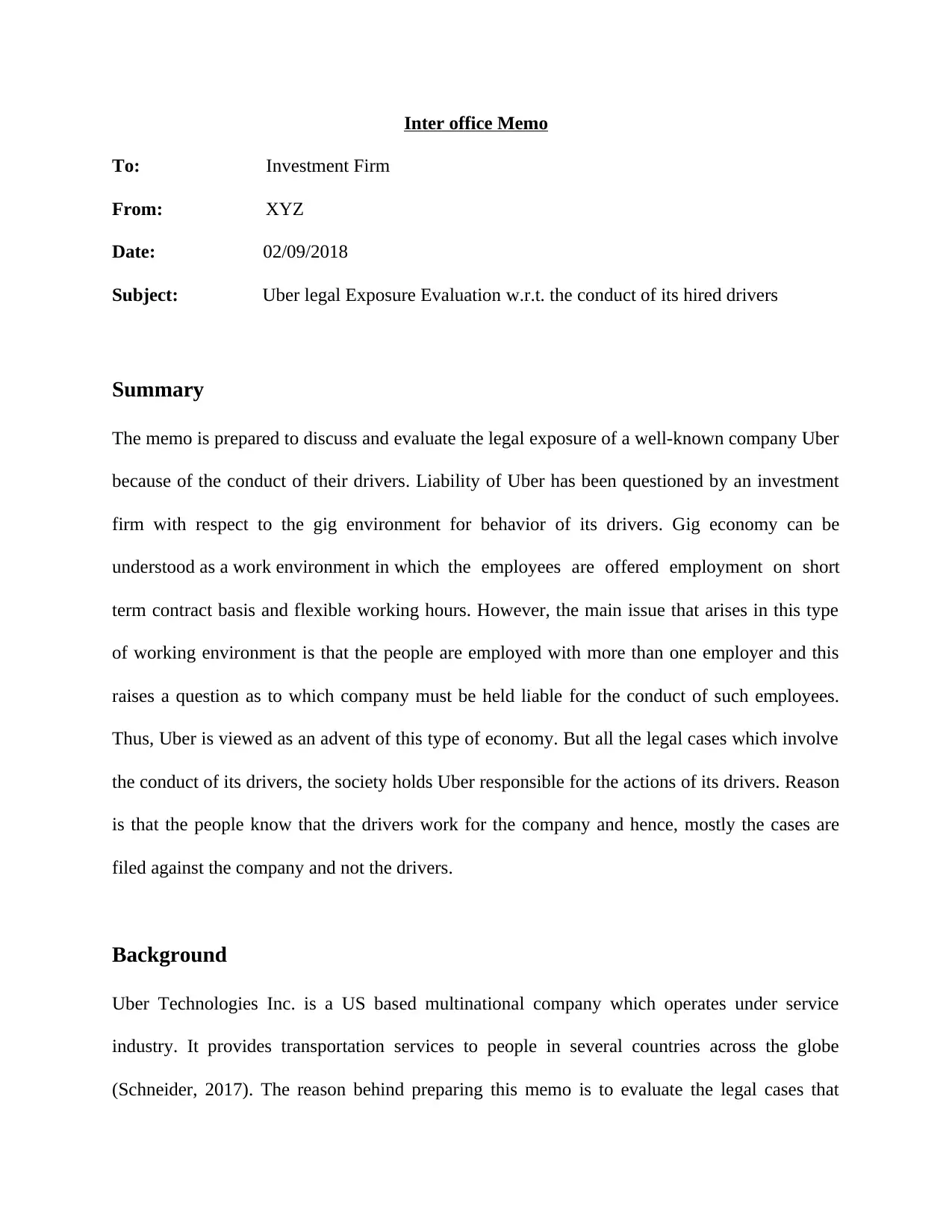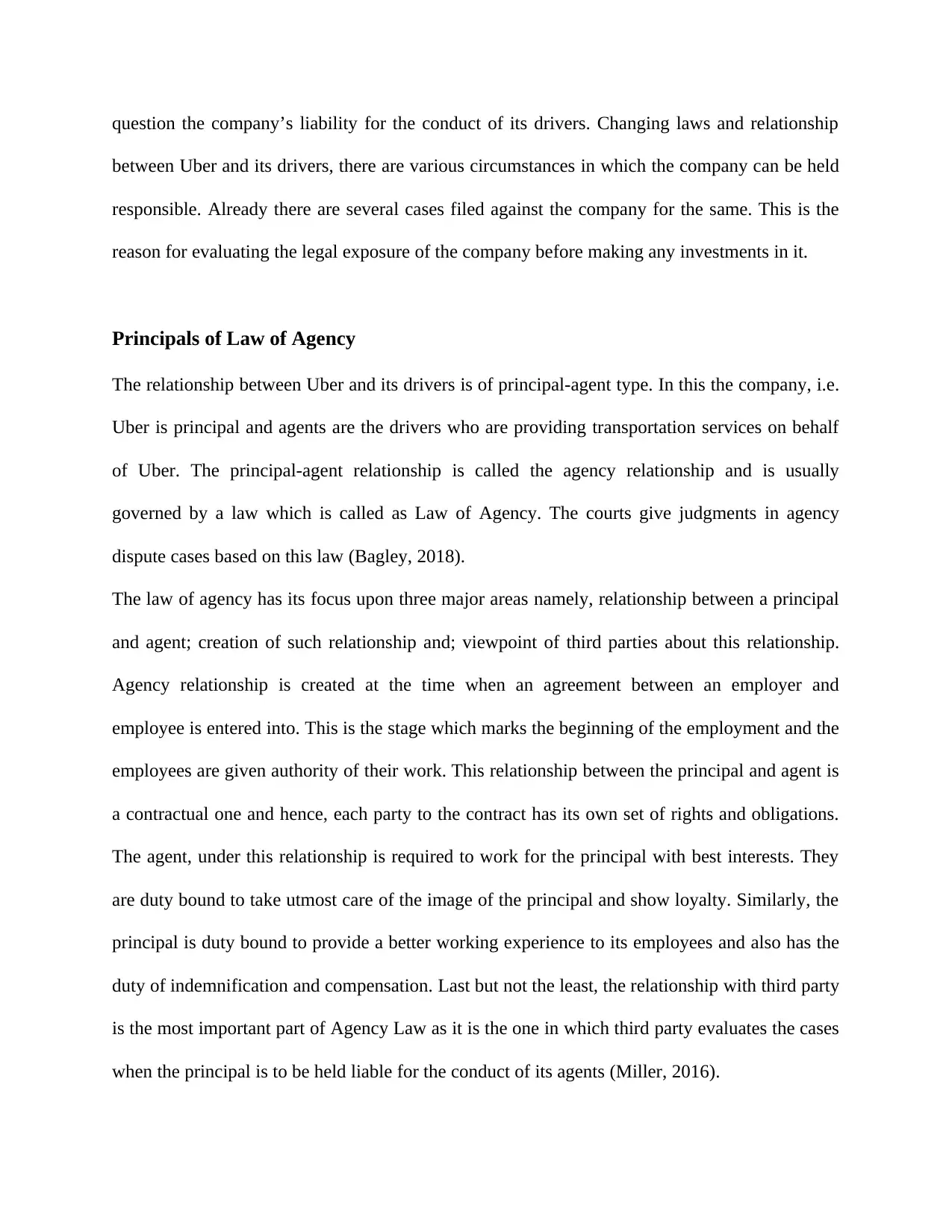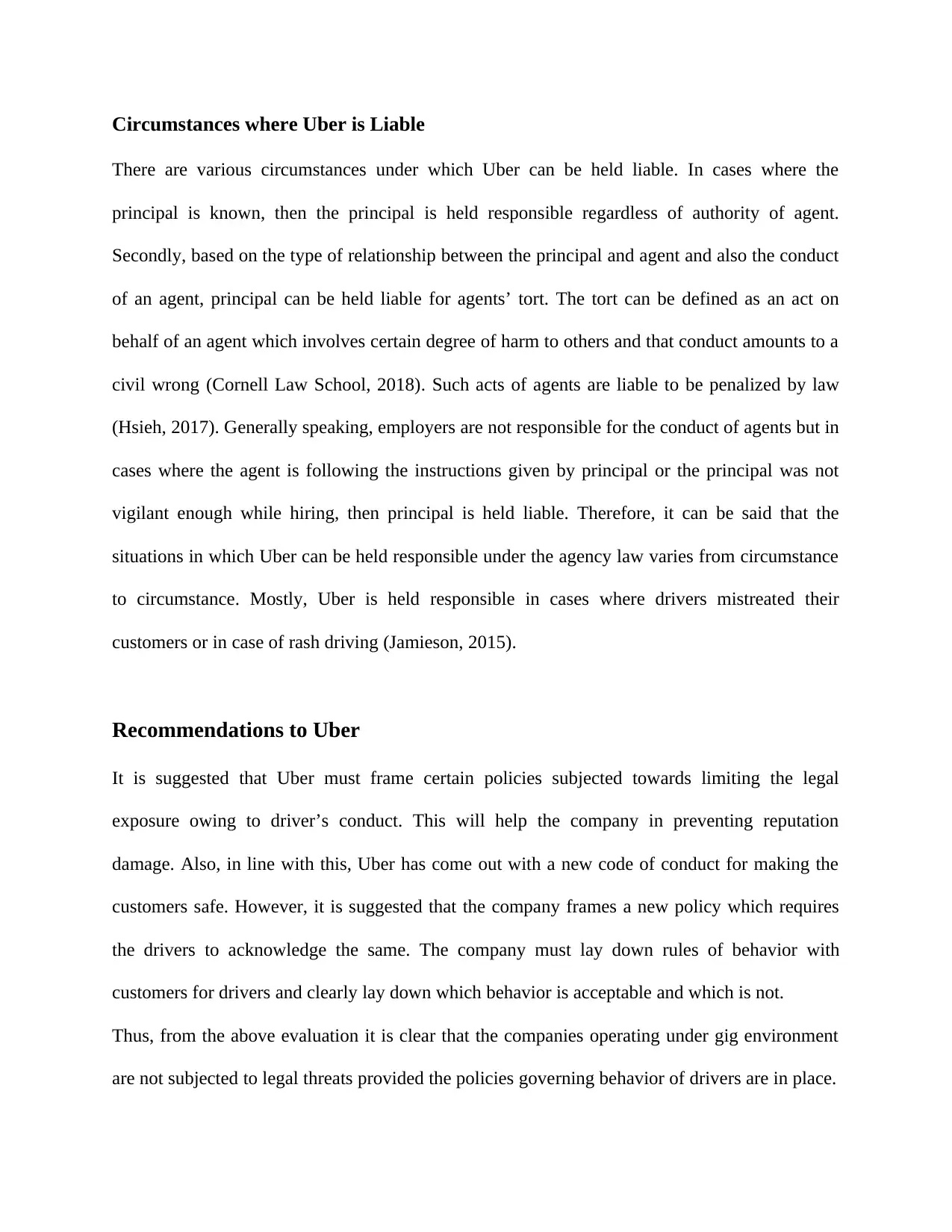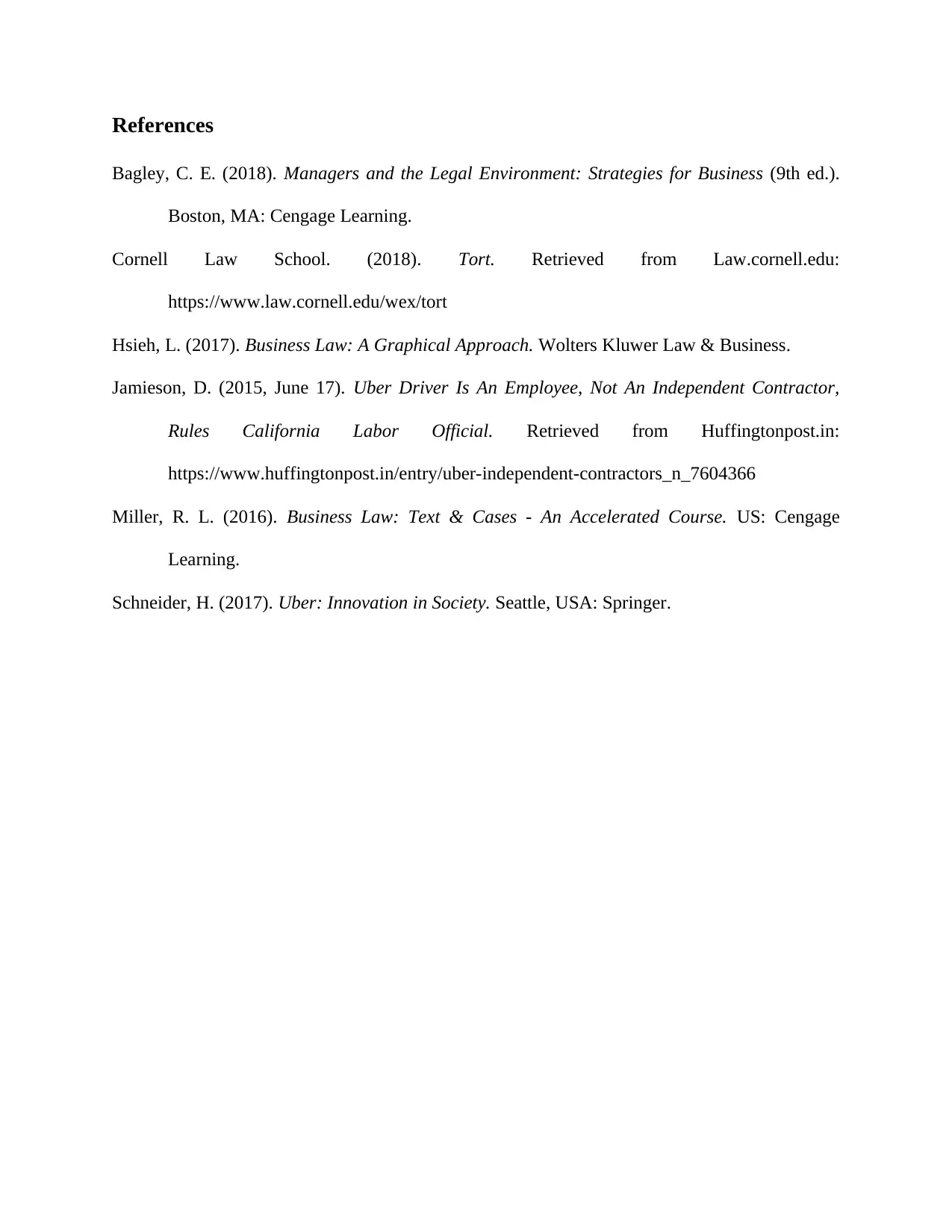Uber's Legal Liabilities: Evaluating Risks from Driver Conduct
VerifiedAdded on 2023/06/07
|4
|1118
|217
Report
AI Summary
This memo evaluates Uber's legal exposure concerning the conduct of its drivers within the gig economy, focusing on the principal-agent relationship and the application of agency law. It highlights circumstances under which Uber can be held liable for the actions of its drivers, such as cases involving mistreatment of customers or rash driving. The report recommends that Uber implement clear policies and codes of conduct for drivers to mitigate legal risks and protect its reputation. By establishing clear expectations for driver behavior, Uber can reduce its exposure to legal liabilities and ensure a safer experience for its customers. The analysis emphasizes that companies in the gig economy can minimize legal threats by proactively managing driver conduct through well-defined policies.

Inter office Memo
To: Investment Firm
From: XYZ
Date: 02/09/2018
Subject: Uber legal Exposure Evaluation w.r.t. the conduct of its hired drivers
Summary
The memo is prepared to discuss and evaluate the legal exposure of a well-known company Uber
because of the conduct of their drivers. Liability of Uber has been questioned by an investment
firm with respect to the gig environment for behavior of its drivers. Gig economy can be
understood as a work environment in which the employees are offered employment on short
term contract basis and flexible working hours. However, the main issue that arises in this type
of working environment is that the people are employed with more than one employer and this
raises a question as to which company must be held liable for the conduct of such employees.
Thus, Uber is viewed as an advent of this type of economy. But all the legal cases which involve
the conduct of its drivers, the society holds Uber responsible for the actions of its drivers. Reason
is that the people know that the drivers work for the company and hence, mostly the cases are
filed against the company and not the drivers.
Background
Uber Technologies Inc. is a US based multinational company which operates under service
industry. It provides transportation services to people in several countries across the globe
(Schneider, 2017). The reason behind preparing this memo is to evaluate the legal cases that
To: Investment Firm
From: XYZ
Date: 02/09/2018
Subject: Uber legal Exposure Evaluation w.r.t. the conduct of its hired drivers
Summary
The memo is prepared to discuss and evaluate the legal exposure of a well-known company Uber
because of the conduct of their drivers. Liability of Uber has been questioned by an investment
firm with respect to the gig environment for behavior of its drivers. Gig economy can be
understood as a work environment in which the employees are offered employment on short
term contract basis and flexible working hours. However, the main issue that arises in this type
of working environment is that the people are employed with more than one employer and this
raises a question as to which company must be held liable for the conduct of such employees.
Thus, Uber is viewed as an advent of this type of economy. But all the legal cases which involve
the conduct of its drivers, the society holds Uber responsible for the actions of its drivers. Reason
is that the people know that the drivers work for the company and hence, mostly the cases are
filed against the company and not the drivers.
Background
Uber Technologies Inc. is a US based multinational company which operates under service
industry. It provides transportation services to people in several countries across the globe
(Schneider, 2017). The reason behind preparing this memo is to evaluate the legal cases that
Paraphrase This Document
Need a fresh take? Get an instant paraphrase of this document with our AI Paraphraser

question the company’s liability for the conduct of its drivers. Changing laws and relationship
between Uber and its drivers, there are various circumstances in which the company can be held
responsible. Already there are several cases filed against the company for the same. This is the
reason for evaluating the legal exposure of the company before making any investments in it.
Principals of Law of Agency
The relationship between Uber and its drivers is of principal-agent type. In this the company, i.e.
Uber is principal and agents are the drivers who are providing transportation services on behalf
of Uber. The principal-agent relationship is called the agency relationship and is usually
governed by a law which is called as Law of Agency. The courts give judgments in agency
dispute cases based on this law (Bagley, 2018).
The law of agency has its focus upon three major areas namely, relationship between a principal
and agent; creation of such relationship and; viewpoint of third parties about this relationship.
Agency relationship is created at the time when an agreement between an employer and
employee is entered into. This is the stage which marks the beginning of the employment and the
employees are given authority of their work. This relationship between the principal and agent is
a contractual one and hence, each party to the contract has its own set of rights and obligations.
The agent, under this relationship is required to work for the principal with best interests. They
are duty bound to take utmost care of the image of the principal and show loyalty. Similarly, the
principal is duty bound to provide a better working experience to its employees and also has the
duty of indemnification and compensation. Last but not the least, the relationship with third party
is the most important part of Agency Law as it is the one in which third party evaluates the cases
when the principal is to be held liable for the conduct of its agents (Miller, 2016).
between Uber and its drivers, there are various circumstances in which the company can be held
responsible. Already there are several cases filed against the company for the same. This is the
reason for evaluating the legal exposure of the company before making any investments in it.
Principals of Law of Agency
The relationship between Uber and its drivers is of principal-agent type. In this the company, i.e.
Uber is principal and agents are the drivers who are providing transportation services on behalf
of Uber. The principal-agent relationship is called the agency relationship and is usually
governed by a law which is called as Law of Agency. The courts give judgments in agency
dispute cases based on this law (Bagley, 2018).
The law of agency has its focus upon three major areas namely, relationship between a principal
and agent; creation of such relationship and; viewpoint of third parties about this relationship.
Agency relationship is created at the time when an agreement between an employer and
employee is entered into. This is the stage which marks the beginning of the employment and the
employees are given authority of their work. This relationship between the principal and agent is
a contractual one and hence, each party to the contract has its own set of rights and obligations.
The agent, under this relationship is required to work for the principal with best interests. They
are duty bound to take utmost care of the image of the principal and show loyalty. Similarly, the
principal is duty bound to provide a better working experience to its employees and also has the
duty of indemnification and compensation. Last but not the least, the relationship with third party
is the most important part of Agency Law as it is the one in which third party evaluates the cases
when the principal is to be held liable for the conduct of its agents (Miller, 2016).

Circumstances where Uber is Liable
There are various circumstances under which Uber can be held liable. In cases where the
principal is known, then the principal is held responsible regardless of authority of agent.
Secondly, based on the type of relationship between the principal and agent and also the conduct
of an agent, principal can be held liable for agents’ tort. The tort can be defined as an act on
behalf of an agent which involves certain degree of harm to others and that conduct amounts to a
civil wrong (Cornell Law School, 2018). Such acts of agents are liable to be penalized by law
(Hsieh, 2017). Generally speaking, employers are not responsible for the conduct of agents but in
cases where the agent is following the instructions given by principal or the principal was not
vigilant enough while hiring, then principal is held liable. Therefore, it can be said that the
situations in which Uber can be held responsible under the agency law varies from circumstance
to circumstance. Mostly, Uber is held responsible in cases where drivers mistreated their
customers or in case of rash driving (Jamieson, 2015).
Recommendations to Uber
It is suggested that Uber must frame certain policies subjected towards limiting the legal
exposure owing to driver’s conduct. This will help the company in preventing reputation
damage. Also, in line with this, Uber has come out with a new code of conduct for making the
customers safe. However, it is suggested that the company frames a new policy which requires
the drivers to acknowledge the same. The company must lay down rules of behavior with
customers for drivers and clearly lay down which behavior is acceptable and which is not.
Thus, from the above evaluation it is clear that the companies operating under gig environment
are not subjected to legal threats provided the policies governing behavior of drivers are in place.
There are various circumstances under which Uber can be held liable. In cases where the
principal is known, then the principal is held responsible regardless of authority of agent.
Secondly, based on the type of relationship between the principal and agent and also the conduct
of an agent, principal can be held liable for agents’ tort. The tort can be defined as an act on
behalf of an agent which involves certain degree of harm to others and that conduct amounts to a
civil wrong (Cornell Law School, 2018). Such acts of agents are liable to be penalized by law
(Hsieh, 2017). Generally speaking, employers are not responsible for the conduct of agents but in
cases where the agent is following the instructions given by principal or the principal was not
vigilant enough while hiring, then principal is held liable. Therefore, it can be said that the
situations in which Uber can be held responsible under the agency law varies from circumstance
to circumstance. Mostly, Uber is held responsible in cases where drivers mistreated their
customers or in case of rash driving (Jamieson, 2015).
Recommendations to Uber
It is suggested that Uber must frame certain policies subjected towards limiting the legal
exposure owing to driver’s conduct. This will help the company in preventing reputation
damage. Also, in line with this, Uber has come out with a new code of conduct for making the
customers safe. However, it is suggested that the company frames a new policy which requires
the drivers to acknowledge the same. The company must lay down rules of behavior with
customers for drivers and clearly lay down which behavior is acceptable and which is not.
Thus, from the above evaluation it is clear that the companies operating under gig environment
are not subjected to legal threats provided the policies governing behavior of drivers are in place.
⊘ This is a preview!⊘
Do you want full access?
Subscribe today to unlock all pages.

Trusted by 1+ million students worldwide

References
Bagley, C. E. (2018). Managers and the Legal Environment: Strategies for Business (9th ed.).
Boston, MA: Cengage Learning.
Cornell Law School. (2018). Tort. Retrieved from Law.cornell.edu:
https://www.law.cornell.edu/wex/tort
Hsieh, L. (2017). Business Law: A Graphical Approach. Wolters Kluwer Law & Business.
Jamieson, D. (2015, June 17). Uber Driver Is An Employee, Not An Independent Contractor,
Rules California Labor Official. Retrieved from Huffingtonpost.in:
https://www.huffingtonpost.in/entry/uber-independent-contractors_n_7604366
Miller, R. L. (2016). Business Law: Text & Cases - An Accelerated Course. US: Cengage
Learning.
Schneider, H. (2017). Uber: Innovation in Society. Seattle, USA: Springer.
Bagley, C. E. (2018). Managers and the Legal Environment: Strategies for Business (9th ed.).
Boston, MA: Cengage Learning.
Cornell Law School. (2018). Tort. Retrieved from Law.cornell.edu:
https://www.law.cornell.edu/wex/tort
Hsieh, L. (2017). Business Law: A Graphical Approach. Wolters Kluwer Law & Business.
Jamieson, D. (2015, June 17). Uber Driver Is An Employee, Not An Independent Contractor,
Rules California Labor Official. Retrieved from Huffingtonpost.in:
https://www.huffingtonpost.in/entry/uber-independent-contractors_n_7604366
Miller, R. L. (2016). Business Law: Text & Cases - An Accelerated Course. US: Cengage
Learning.
Schneider, H. (2017). Uber: Innovation in Society. Seattle, USA: Springer.
1 out of 4
Related Documents
Your All-in-One AI-Powered Toolkit for Academic Success.
+13062052269
info@desklib.com
Available 24*7 on WhatsApp / Email
![[object Object]](/_next/static/media/star-bottom.7253800d.svg)
Unlock your academic potential
Copyright © 2020–2025 A2Z Services. All Rights Reserved. Developed and managed by ZUCOL.





